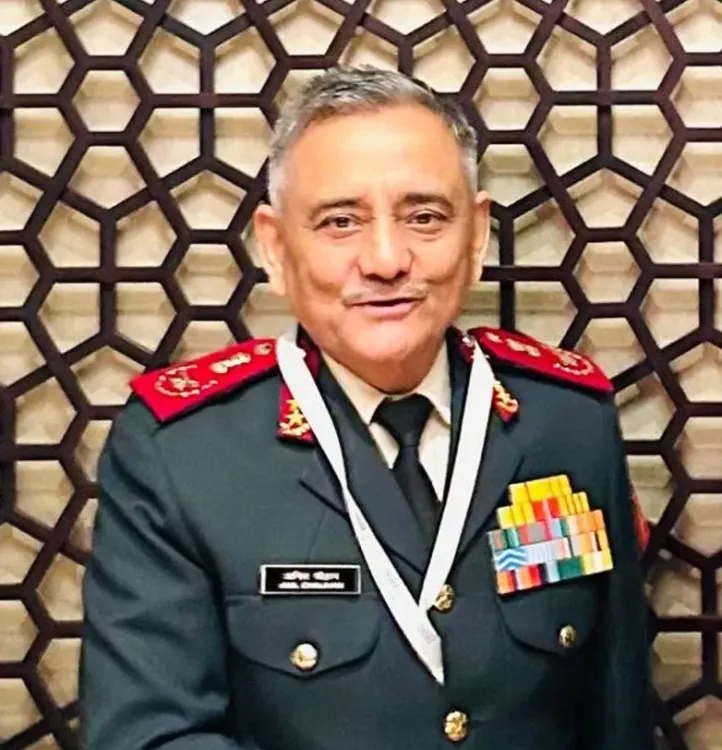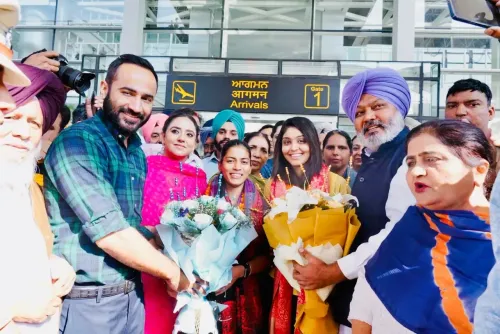What Price Does Terrorism Carry? CDS Anil Chauhan Critiques Pakistan's Duplicity on the Global Platform

Synopsis
Key Takeaways
- CDS Anil Chauhan's remarks indicate a new zero-tolerance policy towards terrorism.
- Operation Sindoor marks a strategic shift in India's defense strategy.
- Pakistan's longstanding support for terrorism is under scrutiny.
- The importance of sustained dialogue amid rising tensions was emphasized.
- Security analysts note India's firm stance against terrorism at the summit.
New Delhi/Singapore June 2 (NationPress) The Shangri-La Dialogue, Asia's premier security forum, featured a significant and direct confrontation between military officials from India and Pakistan, set against the backdrop of rising tensions following the recent Pahalgam terror incident.
As per high-ranking sources at the event, India's Chief of Defence Staff (CDS), General Anil Chauhan, conveyed a clear message indicating that New Delhi's tolerance for cross-border terrorism has reached its breaking point.
During a confidential session focused on regional security threats, General Chauhan made a strong reference to India's recent Operation Sindoor—a targeted military operation aimed at dismantling terror infrastructure in Pakistan-occupied Kashmir and beyond the border.
"This operation signifies a decisive transformation in India's approach," sources cited General Chauhan. "A new boundary has been established. The period of strategic restraint in the face of terrorism is concluded."
While the Indian general refrained from directly naming Pakistan, his comments included unmistakable references to its enduring support for proxy terrorist groups.
“We have endured over two decades of a proxy war. The human cost in civilian lives, our soldiers, and the economic impact is intolerable,” Chauhan reportedly declared.
“Operation Sindoor was not merely a tactical maneuver; it was a strategic message.”
This exchange occurred during parallel sessions where Pakistan's Chairman of the Joint Chiefs of Staff Committee, General Sahir Shamshad Mirza, followed a familiar pattern, advocating for “conflict resolution” regarding Kashmir and cautioning about the dangers of escalating tensions.
In a discussion panel on crisis-management strategies, Mirza contended that the lack of ongoing dialogue could spiral into uncontrollable conflict.
He reiterated Pakistan's long-held stance that the Kashmir issue ought to be resolved “in line with UN resolutions and the sentiments of the people.”
However, Indian defense officials dismissed Mirza's statements as “predictable deflection,” highlighting Islamabad’s ongoing support for terrorist organizations.
“While Pakistan promotes peace, it harbors those responsible for mass atrocities like Pahalgam,” remarked an official from the Indian delegation.
India initiated Operation Sindoor on May 7 as a direct counteraction to the April 22 terror attack on tourists in Pahalgam, Jammu and Kashmir, which resulted in 26 fatalities. The four-day operation, which involved precision strikes on at least nine terror launchpads across the border, concluded on May 10 after India briefed multiple nations, including the U.S., U.K., and UAE, on its goals and outcomes.
General Chauhan emphasized that India's actions were “limited, lawful, and targeted,” designed to ensure long-term deterrence. He warned that if Pakistan fails to draw the right conclusions from this, the repercussions next time could be significantly more severe.
Security analysts attending the summit observed that while Pakistan sought to internationalize the Kashmir issue once more, India positioned itself as a responsible power enforcing strict boundaries against terrorism.









